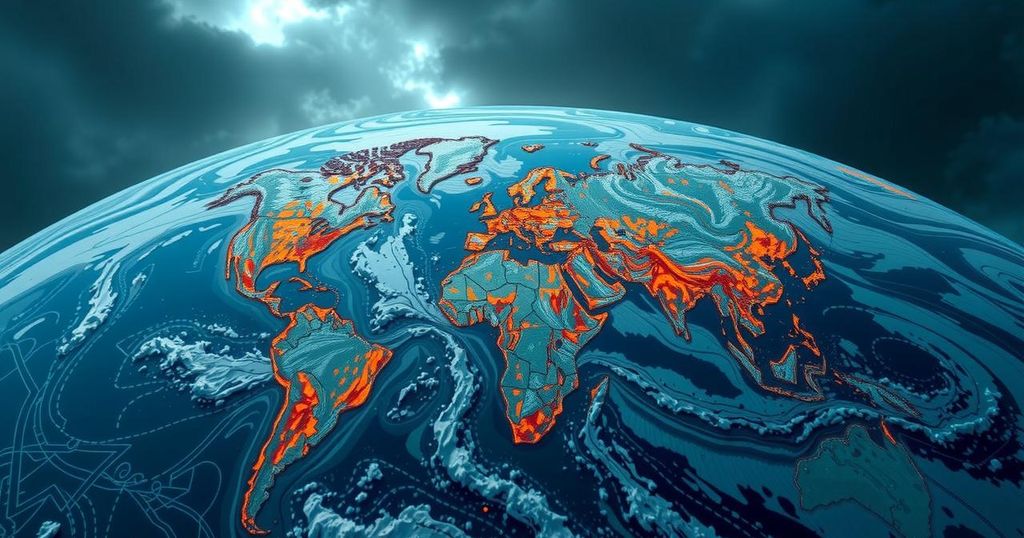The climate crisis significantly contributes to the frequency and intensity of extreme weather events, such as heatwaves, floods, and droughts. Through climate attribution studies, overwhelming evidence indicates that human-induced global warming has exacerbated nearly all observed heat events. The societal impact extends to increased mortality rates, particularly in vulnerable populations, while legal accountability is emerging for corporations responsible for emissions. The urgency for collective action against climate change is highlighted by these alarming findings.
The inquiry into whether the climate crisis is responsible for extreme weather events has become increasingly vital due to their devastating impact on human lives and infrastructure globally. Determining the extent to which global warming contributes to such severe weather patterns necessitates rigorous scientific examination, known as climate attribution. This methodology reveals concerning findings: human-induced climate change has significantly influenced the frequency and intensity of events such as heatwaves, floods, and storms, marking them as unprecedented occurrences in recent human history. Attribution studies deploy three primary approaches to assess the relationship between current weather extremes and historical climates. By comparing contemporary weather data with historical data, scientists can evaluate how the frequency and severity of these events have changed. Furthermore, climate simulation models that reflect pre-industrial conditions allow researchers to identify trends in extreme weather tied to rising emissions. The results of these studies underscore a critical reality: many extreme heatwaves are now viewed as virtually impossible without the influence of climate change. The most compelling evidence originates from analyses of heatwaves, with over 200 assessments indicating that 95% of these events have been exacerbated by global heating. Additionally, various studies highlight that the overall intensity of rainfall and the likelihood of floods have increased due to rising temperatures, although the assessments for floods are more complex, factoring in geography and infrastructure. Nonetheless, a significant number of drought events have also been shown to be more likely as a result of climate change. Moreover, an alarming trend identifies the disproportionate impact of extreme weather on vulnerable populations, especially in developing nations. Attribution science enables researchers not only to analyze extreme weather events but also to assess the resultant societal impacts, such as mortality rates. Recent studies have indicated that many extreme weather deaths could have been avoided had global temperatures remained within historical norms. Specific cases like Hurricane Harvey emphasize how climate change directly affects the severity of destruction, with substantial portions of affected properties attributed to rising temperatures. Additionally, attribution studies are gaining traction as legal tools to hold corporations accountable for climate-related damages. Cases such as Juliana v United States exemplify how scientific evidence links specific climate damages to corporate pollution. While not every weather event receives a dedicated study, enough research has amassed to confidently assert that nearly all extreme rainfall events have become more intense globally. The evidence is overwhelmingly indicative that the climate crisis is not a distant threat but rather a current reality, inflicting significant societal and environmental harm.
Understanding the climate crisis’s impact on extreme weather events is fundamental to climate science and public policy. The advancements in climate attribution techniques have allowed for comprehensive evaluations of how human activities, particularly the burning of fossil fuels, modify weather patterns. These scientific explorations assist in deciphering the intricate links between human activities and severe weather phenomena, highlighting critical trends and societal implications of climate change — especially for vulnerable communities.
In summary, there is substantial evidence linking extreme weather events to climate change, with scientific attribution studies providing clarity on this relationship. The overwhelming majority of heatwaves and a significant percentage of floods and droughts have been intensified by global heating. Furthermore, the implications of these findings extend beyond mere weather statistics, emphasizing the urgent need for accountability and adaptation strategies to protect vulnerable populations from the repercussions of climate disasters. The growing body of evidence serves as a clarion call for immediate global action to mitigate climate change and its severe outcomes.
Original Source: www.theguardian.com






